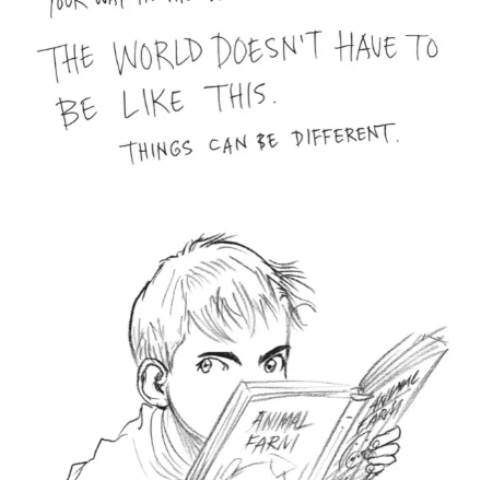

In 2013, award-winning author Neil Gaiman was the speaker for The Reading Agency annual lecture. In his speech, he launched an impassioned plea for true understanding of what reading for pleasure can do for a child in the present and society in the future. In straight-to-the-point fashion, Gaiman made one of the best arguments I’ve ever seen for the importance of reading (and I’ve seen a LOT. I’m a librarian):
I want to talk about what reading does. What it’s good for.
I was once in New York, and I listened to a talk about the building of private prisons – a huge growth industry in America. The prison industry needs to plan its future growth – how many cells are they going to need? How many prisoners are there going to be, 15 years from now? And they found they could predict it very easily, using a pretty simple algorithm, based on asking what percentage of 10 and 11-year-olds couldn’t read. And certainly, couldn’t read for pleasure.
It’s not one to one: you can’t say that a literate society has no criminality. But there are very real correlations.
And I think some of those correlations, the simplest, come from something very simple. Literate people read fiction.
Fiction has two uses. Firstly, it’s a gateway drug to reading. The drive to know what happens next, to want to turn the page, the need to keep going, even if it’s hard, because someone’s in trouble and you have to know how it’s all going to end … that’s a very real drive. And it forces you to learn new words, to think new thoughts, to keep going. To discover that reading per se is pleasurable. Once you learn that, you’re on the road to reading everything. And reading is key. There were noises made briefly, a few years ago, about the idea that we were living in a post-literate world, in which the ability to make sense out of written words was somehow redundant, but those days are gone: words are more important than they ever were: we navigate the world with words, and as the world slips onto the web, we need to follow, to communicate and to comprehend what we are reading. People who cannot understand each other cannot exchange ideas, cannot communicate, and translation programs only go so far.
The simplest way to make sure that we raise literate children is to teach them to read, and to show them that reading is a pleasurable activity. And that means, at its simplest, finding books that they enjoy, giving them access to those books, and letting them read them.
This speech resonated so well with parents, teachers, librarians, and readers from all over that Gaiman and his illustrator Chris Riddell turned his speech into a book. For this year’s Banned Books Week, I want to simply share Gaiman’s ideas. To share a few of those pages around the school and in the library and to reinforce the notion that
“…libraries are about freedom. Freedom to read, freedom of ideas, freedom of communication. They are about education (which is not a process that finishes the day we leave school or university), about entertainment, about making safe spaces, and about access to information.”
Click here to read Neil Gaiman’s full speech.